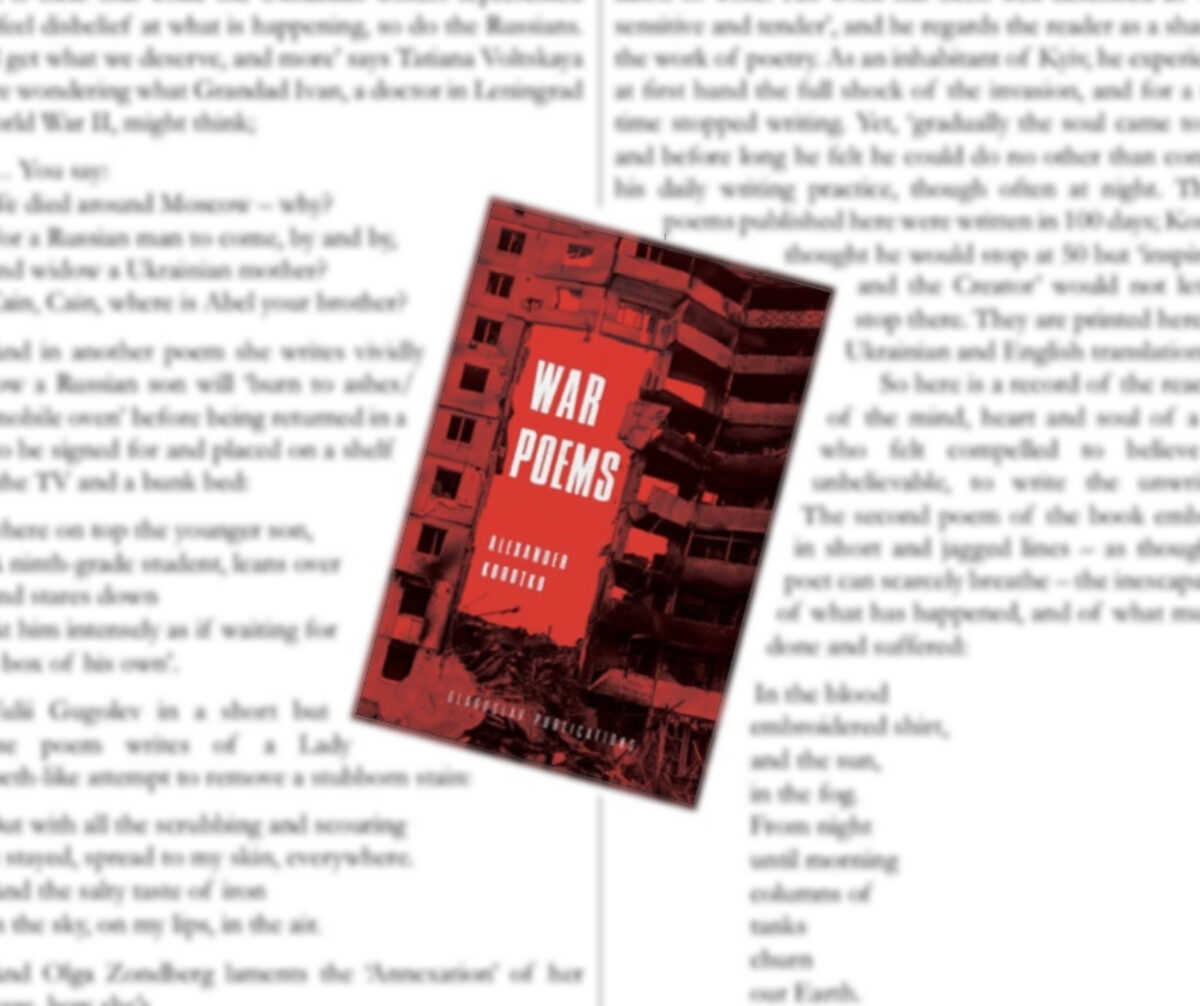The latest issue of the acclaimed British literary magazine East-West Review / SpringSummer 2023 has an article dedicated to Alexander Korotkaia’s book “War”.
The collection of poems “War poems” was published in autumn 2022 by Glagoslav Publications. The collection is published in a unique trilingual format and contains 88 poems written in less than 100 days of the war.
We publish a translation of the original article below:
War
Aleksandra Korotko (Translators: Andrew Sheppard and Olga Ilchuk)
(Glagoslav Publications, 2022) 218 pp, £20 ISBN 978-1914337932
Reviewed by Kate Persglove
Alexander Short’s War certainly shares many of Short’s themes and sentiments and is certainly a very different book. Korotko, an internationally acclaimed and beloved Ukrainian poet and writer who began writing in Russian in the 1980s, saw himself as the natural successor to the poets of the Russian Silver Age and said that he “would like to end by speaking for Vladimir Vysotsky”. He approvingly quoted the order of Gogol, a fellow Ukrainian, “practice, practice, write!” and observed this order,
perceiving his work as a vocation and often rising every day before dawn to write.
His work is well described as ‘deep, sensitive and tender’ and he views the reader as a participant in the work of poetry. As a Kievan, he personally experienced and survived the total shock of the invasion, and briefly stopped writing. But ‘gradually the soul came alive’, and he soon felt he could do nothing but continue his daily writing practice, albeit often at night. The 88 poems published here were written in 100 days; Short thought he would stop at 50, but ‘inspiration and the Creator did not allow him to stop there. They are published here with Ukrainian and English translations. So here is a record of the reactions of the mind, heart and soul of a poet who was forced to believe what cannot be believed, to write what cannot be written. The second poem in the book embodies, in short and jagged lines – as if the poet were barely breathing – the inevitability of what has happened and what must be done and suffered:
At first there is a sense of bitterness over the imagined detachment of “you, in Europe/ … with a white flag and a heart of stone” and a shock at how life has been “rent before and after”. Gradually the war becomes something known; always present, but always different, alien, like a cancer. The poems, and often the lines get longer and convey the different faces of war, but there is no release from the grinding monotony, pain and constant fear – “Night has a hiding place called fear”. Spring appears, but without liberation, and summer is barely noticed by the rains. The colour is red and black (even honey is “bitter” and “black”) and increasingly grey. The sun, moon and stars (“confetti” or “mosquito bites”) often appear and are sometimes reflected in or reflected by candles burning for the dead. And fatigue, weariness and exhaustion appear more and more often. The earth is tired of war’, souls are tired, and also Lenin in his mausoleum of eternal rest is tired of endless people passing by. You feel tempted to ask yourself the question that arises from looking at Goya’s The Terrors of War – how could the artist experience and empathise with this depth of suffering and retain the strength and energy to portray it so exhaustively, so precisely and with such emotional depth? At least part of the answer for Short must be a love that lives despite the pain. In Homeland, the last poem of the book.
Alexander Korotko, of course, continues to write, and since the publication of War, the book in question, he has been working on his next collection, entitled Blackout.
It is about the blackout that often hit Kiev and much of Ukraine in the winter of 2022-23, as Russia hit Ukraine’s electricity production and distribution systems.
This poem “Glory to Ukraine” is dedicated to Aleksandr Igorevich Matsiyevsky, a prisoner of war who was captured and executed by the Russians in late December 2022. A video of his murder began circulating in March 2023. Aleksandr Macijewski’s last words were “Glory to Ukraine”.
The magazine published new poems by the author which were not included in the collection War: Blackout, Coming Home, and Glory to Ukraine.
The full issue of East-West Review/SpringSummer 2023 in its original language is added below.
The article is dedicated to Oleksandr Korotko’s book on pages 33-35.
